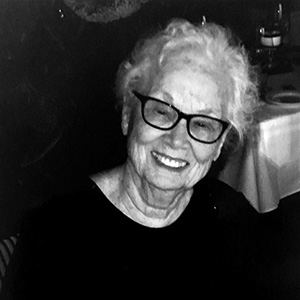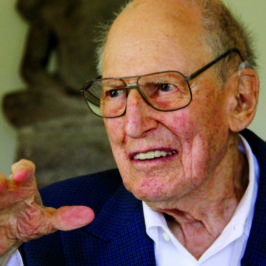




Love and romance, with poems by Denise Rue, C. W. Emerson, Marge Piercy, Chuck Madansky and Dorothy Weil.
7 minutes
TRANSCRIPT
It’s that time of year when we give and get red roses and heart-shaped boxes of chocolates and love notes ranging from the goopy to the moving to the heart-poundingly sincere. It’s that time of year when we used to go out for a romantic dinner, but now in these Pandemic times, we stay home and remember when we used to go out for a romantic dinner.
Here’s Denise Rue’s poem “The Language in Which I Love You” from Passager Issue 65. She said she wrote it “for the man I loved after my husband died. He too was widowed. It’s about the courage of the heart, how we go on after loss.”
for Rolando
Mi amor, I have tried to master the language learned at your mother’s knee,
arroz con pollo and pasteles on the stove, your father sipping Don Q,
cousins dancing to Tito Rodriquez and Hector Lavoe.
I have tried to master gender – the feminine artichoke, the masculine bone –
my tongue too tense to trill, a threshing machine of glottals and stops.
So I will love you in the language of unreasonable hope, blue ribbon’d
and banjo-happy. The canary has died, the last chemicals
dripped into veins. Aren’t we brave, to swim to each other’s shores,
refugee-hearted and stubborn, believing the promise
of the manacle unclasped, your name tattooed on my wrist.
“The Language in Which I Love You,” Denise Rue.
Next, C. W. Emerson’s poem “Love and Bone.”
If we are only bodies –
flesh and muscle, breath and bone,
temporary, fleeting,
motes of dust on a butterfly wing –
then let our time on earth
be a calendar of feasts:
days that bow, deep and shy,
as if to hide how fine they are;
and let the extravagant lace of evening
come and cover us like a veil –
we fortunate lovers,
living our lives,
here, in our carnal kingdom.
“Love and Bone” by C.W. Emerson from Passager Issue 65. The author said, “My poetry teacher found the title too suggestive, but I like the juxtaposition of soft/love with hard /bone and the way they reverse positions.”
In 2011, Passager published an anthology of work from its first 21 years. The book was titled Burning Bright – from which this podcast got its name. Here from that anthology is the prolific Marge Piercy’s poem “They Don’t Tell You How Sex Changes.”
Sex impinges less as I grow older
but is more precious, that some
one, the one and only now,
still desires, that the furnace
can yet be lit and finally roar.
Intimacy opens slowly as a rose –
an old garden rose, a centifolia
with its crowded labyrinth of petals
dark pink as labia, ruddy with
amorous perfume thick as honey.
No more quick ones in the bushes.
We like a bed and time that does
not press in constricting us.
We like to loll in moments before
the pulse rushes in toppling waves.
We take much pleasure in kissing
that once we passed through, gateway
to what we really sought. We linger
in sensuality keen as orgasm pro-
longed like an endless chord.
“They Don’t Tell You How Sex Changes,” Marge Piercy.
Marge Piercy lives in Wellfleet on Cape Cod. Chuck Madansky lives a few miles up-Cape in Dennis. Here’s his poem “Anniversary.”
We didn’t think of death when we first met.
Our bodies felt each other out for truth.
The suns that never lighted us had set –
the brighter day we hoped for in our youth.
Yet there you were, a truth at last revealed:
A grace, a gift, a molten light, a sun.
We found in love how broken could be healed,
how fetters on the spirit come undone.
Though marriage long and deep has been a jewel,
opening our eyes to every facet,
the truth is life itself, in death, is cruel,
void of any way to leave or pass it.
In loving you, I’ve learned to love this life,
worth dying for, as long as you’re my wife.
From Passager Issue 70, “Anniversary” by Chuck Madansky.
Finally, Dorothy Weil’s “The Gentleman Caller.”
What will he wear?
Will he have a smile on his face?
Will he bring a corsage?
Oh, we have a date.
Will he bare his teeth?
Drag me by the hair
Or put me down to sleep
Like a good daddy?
Do I know him?
Does he drive?
Is he a bruiser?
He may forewarn me,
Take things slow.
He may wear the mask of the ax man.
Or a tuxedo.
He may creep up behind me
With a sudden blow.
Torture might be his game.
Is that his footstep on the stairs?
I haven’t put my lipstick on,
I haven’t brushed my hair . . .
“The Gentleman Caller,” Dorothy Weil from Passager Issue 68.
To buy the anthology Burning Bright or subscribe to or learn more about Passager and its commitment to writers over 50, go to passagerbooks.com.
You can download Burning Bright from Spotify, Apple and Google Podcasts, Audible, and a host of other podcast apps.”
For Kendra, Mary, Christine, Rosanne, and the rest of the Passager staff, I’m Jon Shorr.






